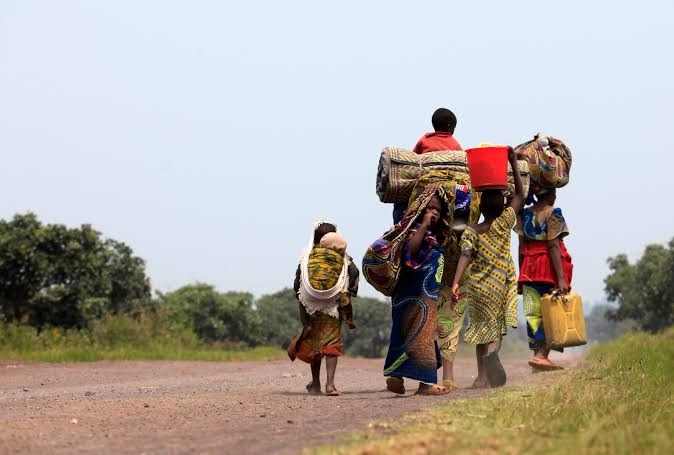Over 300,000 Nigerians Displaced Due To Herders-Farmers Clashes In North-central Nigeria – Research
Conflicts between herders and farmers in four states in North-central Nigeria have displaced 300,000 Nigerians, according to a research.

Research has revealed that more than 300,000 Nigerians have been displaced in four north-central states in the country because of the raging farmers and herders crisis.
The research, “Trends and Dynamics of Conflict between Farmers and Pastoralists in Nigeria’s Benue Valley,” was carried out by Zinariya Consult, a development and policy advocacy firm, with support from Global Rights and Open Society Initiative for West Africa (OSIWA).
It listed the states as Benue, Plateau, Nasarawa and Taraba as the Benue Valley.
According to Joseph Ochogwu, one of the lead researchers and associate professor with the Institute for Peace and Conflict Resolution, perennial conflicts over land grazing rights and scarce water resources in the Benue Valley have heightened tensions between farmers and herders.
Ochogwu said the conflicts have led to deaths, loss of livelihoods, displacements and disruption of economies within the area, adding that the conflict threatens the country’s food security and stability.
He also explained that the crisis had assumed ethnic and religious dimensions.
According to him, the research’s key findings showed trends and patterns of the conflict, gender dimension of the conflict, demographic shift, mental health and psychological support, and community resilience, among others.
He noted that between 2018 and 2019, access to water and grazing land became more competitive.
This, Ochogwu noted, led to frequent arguments with distrust due to differences in ethno-religious and cultural identities and values becoming more pronounced.
“From 2001 to 2018, about 60,000 deaths were recorded in multiple clashes, it is estimated that more than 300,000 were displaced across states, 176,000 in Benue, about 100,000 in Plateau, and 100,000 in Nasarawa and about 19,000 in Taraba,” Ochogwu said while presenting a policy brief on Thursday in Abuja.
“These displacements were mainly due to the surge of attacks and counter-attacks by the headers and farmers communities, in Benue alone, it is estimated that the crisis led to more than N400 billion economic losses resulting from destruction of properties.”
“Between 2017 and May 2020, 645 attacks were carried out, 2,539 people were killed and 254 kidnappings were recorded in various states in Nigeria.”
Recommendations
According to one of the research’s recommendations, governments at all levels must work together to deploy a joint task force comprising the Army, Navy, Airforce, Police, paramilitary, and civil institutions to restore law and order, and build the population’s confidence in the government.
The complex nature of the conflict required participatory, inclusive, coordinated and sustainable solutions, the research noted.
As part of the recommendations, state governments were urged to strengthen the already existing community policing structure such as vigilantes for intelligence gathering as well tackle youth unemployment in their states.
The research also recommended that development partners join hands with the government and community-based organisations to ensure that women are mainstreamed in peace building programmes.
The governments should also work with Civil Society Organisations, media organisations, gender and peace building experts to develop programmes using conventional media, and social media among others to deconstruct social norms, it said.
“The Federal Government to order the investigation of all recent violence between farmers and pastoralists and expedite the trials of individuals or groups found to have participated, sponsored or involved in violence.”
“State governments in Benue, Plateau and Taraba should recognise the critical role of religious and traditional institutions in peace building in the communities and include them in direct government and policy formulation process,” it said.
“Formal multi-stakeholders alternative resolution mechanisms should be set up at the state and council levels. Government must support projects on social protection after conflicts such as asset transfers and capacity building for income diversification.”
Support Our Journalism
There are millions of ordinary people affected by conflict in Africa whose stories are missing in the mainstream media. HumAngle is determined to tell those challenging and under-reported stories, hoping that the people impacted by these conflicts will find the safety and security they deserve.
To ensure that we continue to provide public service coverage, we have a small favour to ask you. We want you to be part of our journalistic endeavour by contributing a token to us.
Your donation will further promote a robust, free, and independent media.
Donate HereStay Closer To The Stories That Matter




